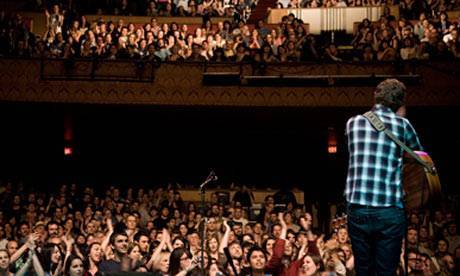
Dan Mangan is a Canadian indie folk-rock singer and songwriter. There is a raw honesty in his voice that is beguiling. His latest album, Oh Fortune, was released to wide acclaim.
Dan recently wrote an article for The Guardian entitled, Magic gig moments. It’s a very personal, very moving article that offers tremendous insight into the life of a musician. It also offers an incredibly important lesson that is as relevant for public speakers as it is for musicians: Your most powerful moments on stage will come when you are willing to be vulnerable. You have to get naked.
Here are some excerpts from the article:

[T]he concerts that I have cherished the most are the ones that left me with very distinct memories. They could be subtle or grand, but my recollection of those evenings are split in to specific moments. An entire evening’s experience recounted decades later, thanks to one action, one facial expression, or a moment of true, unconscious “aliveness”. … When I play a concert, I want to create those memories for myself and for the audience. … I want people to go home with a story to tell. I want to leave a footprint …
———
So how do you do that at every show? How do you make that night any more memorable than the last, while walking the balance beam that keeps it sincere, honest and in-the-now? … You have to put in the work.
———
You have to get vulnerable. It’s a scary thing to do, but the payoff is enormous. People get bossed around by the fear. The fear of your vulnerability not being reciprocated. Non-reciprocation can be painful, but giving in to that fear is how we bond as people. That’s when we feel faith in humanity. Those warm moments of colour in the tepidness of status-quo life.
———
We watch people on a stage. The ones who really blow our minds are the ones who tap in to that carnal part of inspired humanity that allows us to just be alright with each other. The ones who really inspire us are the ones who put down their armour. They get naked with such brilliance that instead of cutting them to bits, everyone in the room wishes they had the balls to get naked, too. They get so vulnerable that we nearly get embarrassed for them, and then it comes around to this whole other thing where we’re not embarrassed for them at all, but now we ourselves are embarrassed that we questioned them to begin with.
———
What I’m suggesting is that those truly memorable moments of gig beauty can only come at the intersection of vulnerability, honesty and spontaneity. You can’t anticipate when they’ll happen. You can’t expect it to be the same moment every night, and you can’t expect you’ll be able to reach that place every show. But when it clicks, it’s magic.
———
It’s like being in on this amazing secret. … You realise that getting vulnerable is a catalyst to having boatloads of memorable moments in your life. You learn that most people will actually meet you there. And you stop caring if they don’t. And you learn to disregard people who don’t “get it”. The good ones will. I want goosebumps as many times as possible, then I want to die gracefully without regret.
Great, great stuff! Public speakers take note. When you allow yourself to get naked on stage, magic moments can occur. So when you speak, the focus should be outward instead of inward. Focus on your message; show some emotion; tell a story; be 100% in the moment; smile. And most importantly, care about your audience. Be like Luciano Pavarotti who said, “Some singers want the audience to love them. I love the audience.”
You can read Dan’s entire article here.
















17 Replies to “"You've Got to Get Naked on Stage"”
This is an amazing article and blog post, John. He also talks about “the difference between reciting a song and living a song”. That is the exact reason for my extra 15 seconds!
Thanks, Olivia. You definitely “live” your speeches. Every. Single. Time.
John
John:
An excellent post. Livingston Taylor has been teaching courses on Stage Performance for over two decades. In an interview about the revised edition of his book, he says similarly that:
“An audience supports you not because they came to you, but because you are able to come to them. And the talented and the good looking never develop the skill of going to an audience because they become used to an audience coming to them.”
Watch it here: http://www.plumtv.com/videos/stage-performance
Last week I blogged about Livingston and discussed his advice on introducing yourself, which also applies to public speakers:
http://joyfulpublicspeaking.blogspot.com/2011/11/lessons-on-stage-performance-from.html
Richard
Richard, thanks very much for the comment and for alerting us to Livingston Tyler. I’d never heard of him before and I very much appreciate his simple but effective wisdom. Thanks for sharing the video link and the link to the good post on your blog.
John
I’m glad you posted this article. I’ve long felt a great speech should be slightly uncomfortable to give. I’ve noticed the times I left myself the most vulnerable in front of a group are the times I struck the deepest in their hearts. It’s nice to see someone who is so accomplished say the same things I’ve strongly believed for so long.
Thanks very much for the comment, Michael. I love your line, “a great speech should be slightly uncomfortable to give”. A great way to make the point and I will definitely remember it.
John
This great post left me teary-eyed. I am happy I could experience his words to be true a few times. It can be such a scary thing to “get naked” sometimes but definitely worth it!
The words Dan chose to describe it are masterful. “The ones who really inspire us are the ones who put down their armour. They get naked with such brilliance that instead of cutting them to bits, everyone in the room wishes they had the balls to get naked, too.”
I found some of his music on YouTube and I bow in front of this artist. Thank you for sharing it.
Thank you Katarina. When we as speakers commit to opening up to our audiences – I mean really opening up – that is truly when the magic happens for speaker and audience. One classic example of this is Benjamin Zander’s TED Talk. He speaks of “shiny eyes” moments, moments that bring tears to our eyes. And that is when, for a brief moment, we leave the world and meet our audience on another level.
Cheers!
John